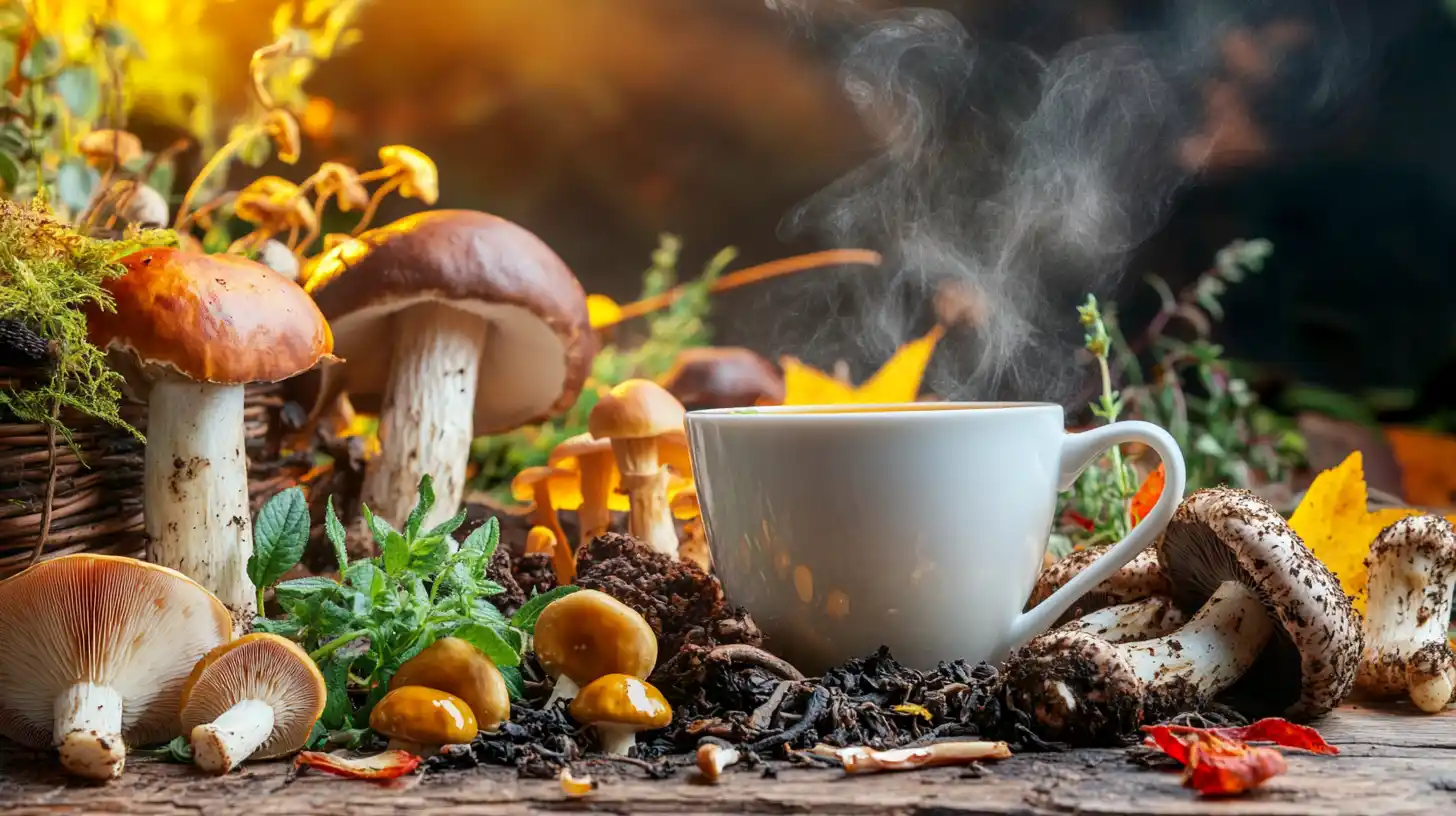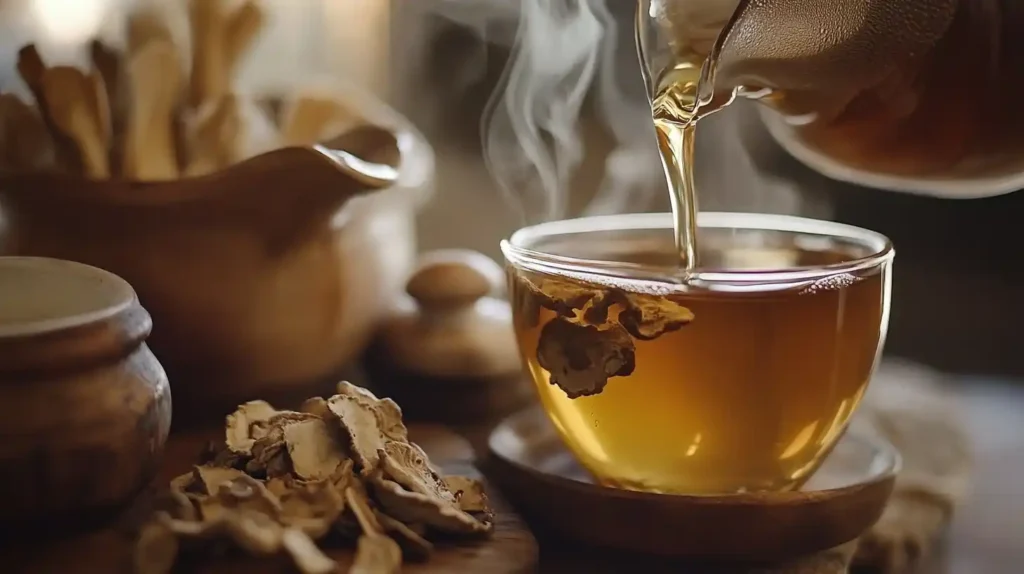Last updated on: January 9, 2025

Mushroom tea is no longer just a niche drink for wellness enthusiasts. From boosting your immune system to improving brain health and reducing stress, this earthy brew is making its way into the daily routines of health-conscious individuals worldwide. But what exactly is mushroom tea, and why should you give it a try? This article will explore everything you need to know—from the types of mushrooms used in teas and their health benefits to how you can make your cup at home.
If you’re curious about the health perks of Mushroom Brew, how it stacks up against coffee, or whether it can help with anxiety and relaxation, you’re in the right place! Let’s dive in.
What is Mushroom Tea?
Mushroom tea is a herbal infusion made by steeping various types of medicinal mushrooms in hot water. It’s not your typical black or green tea; instead, it taps into the power of functional mushrooms that have been used in traditional medicine for centuries.
Overview of Mushroom Tea
At its core, mushroom tea is a simple beverage that extracts the beneficial compounds from mushrooms into a drinkable form. Unlike eating mushrooms, brewing them into tea can make their unique compounds more bioavailable, meaning your body absorbs the nutrients more effectively.
But don’t worry—Mushroom Brew won’t taste like a plate of sautéed mushrooms! The right preparation can be surprisingly mild and earthy, often enhanced with flavors like ginger, lemon, or honey.
Origins and Traditional Uses of Mushroom Tea
The use of mushrooms in teas dates back thousands of years, especially in Eastern cultures. In Traditional Chinese Medicine (TCM), mushrooms like Reishi and Chaga were prized for their adaptogenic properties—helping the body adapt to stress and restore balance. Siberian peoples made Chaga tea to strengthen the immune system and endure severe winters, while Buddhist monks brewed Lion’s Mane tea to sharpen focus during meditation.
In recent years, Chaga tea has gained popularity in the West, thanks to growing interest in holistic health and natural remedies.
Types of Mushrooms Commonly Used in Teas
Several types of medicinal mushrooms are used to make Chaga tea, each offering distinct health benefits:
- Reishi: Known as the “mushroom of immortality,” Reishi is often used to promote relaxation and improve sleep quality.
- Lion’s Mane: This mushroom is famous for its brain-boosting properties, supporting memory, focus, and cognitive function.
- Chaga: Rich in antioxidants, Chaga is believed to strengthen the immune system and reduce inflammation.
- Cordyceps: Popular for its energy-enhancing properties, Cordyceps is often used by athletes to improve endurance.
- Turkey Tail: This mushroom is known for its gut health benefits and its potential to support the immune system during illness.
Mushroom tea is not a one-size-fits-all drink. Each type of mushroom offers unique benefits, and many blends combine multiple mushrooms to deliver a broader range of health perks.
Health Benefits of Mushroom Tea
Mushroom tea offers a variety of health perks that go beyond a typical herbal brew. Loaded with antioxidants, adaptogens, and immune-boosting compounds, it has gained popularity as a natural remedy for several health concerns. Whether you’re looking to improve your focus, enhance your immune system, or simply enjoy a caffeine-free alternative to coffee, Chaga tea might be your next wellness go-to.
Immune System Support
One of the biggest draws of mushroom tea is its ability to strengthen the immune system. Medicinal mushrooms such as Chaga and Turkey Tail are rich in beta-glucans—compounds that can help regulate your immune response. This means they don’t just boost immunity; they also help your body respond more effectively to infections and illnesses.
Research suggests that regular consumption of Chaga mushroom tea can help reduce inflammation, which is a common cause of chronic diseases. So, if you’re looking for a natural way to stay healthy, a warm cup of Mushroom Brew might just do the trick.
Enhanced Focus and Cognitive Function
If you’re struggling to stay focused during long workdays, Lion’s Mane mushroom tea could be a game-changer. Lion’s Mane is known for its neuroprotective properties, promoting the growth and repair of nerve cells in the brain.
Many people turn to this tea as a natural way to support memory and reduce the risk of cognitive decline. Unlike coffee, which can leave you jittery, Lion’s Mane tea provides a steady boost of mental clarity without the crash.
Looking for more healthy beverages to try? Check out Totally Foodie’s guide to matcha muffins to pair with your tea break!
Anti-Inflammatory and Antioxidant Properties
Most types of mushroom tea, especially Reishi and Chaga, are packed with antioxidants. These compounds help combat free radicals in the body, reducing oxidative stress and lowering the risk of chronic diseases such as heart disease and cancer.
In addition to their antioxidant properties, these mushrooms are known for their anti-inflammatory effects. This makes Chaga tea a popular choice for people dealing with chronic inflammation-related conditions like arthritis.
Heart Health and Blood Sugar Regulation
Mushroom teas, particularly those made with Reishi and Cordyceps, may help regulate blood pressure and improve heart health. Reishi is known for its ability to lower LDL (bad) cholesterol, which can reduce the risk of heart disease.
Cordyceps, on the other hand, has been shown to help regulate blood sugar levels, making it a great choice for people with diabetes or those looking to maintain steady energy levels throughout the day.
Different Types of Mushroom Teas and Their Unique Benefits
There’s no one-size-fits-all when it comes to Mushroom Brew. Each type of mushroom offers its unique health benefits, and knowing which one to choose can help you achieve your wellness goals.
Reishi Mushroom Tea for Relaxation and Sleep
Reishi mushroom, often referred to as the “mushroom of immortality”, is known for its calming effects. Drinking Reishi tea before bed can help reduce stress, promote relaxation, and improve sleep quality. It’s a great option for those struggling with insomnia or anxiety.
Adding a slice of ginger or a spoonful of honey can make this tea even more soothing and flavorful.
Lion’s Mane Mushroom Tea for Brain Health
Looking to boost your brainpower? Lion’s Mane mushroom tea is celebrated for its cognitive-enhancing properties. It supports brain function by promoting nerve growth and repair, which can help improve memory, focus, and mental clarity.
Lion’s Mane tea is an excellent alternative to coffee, especially for those who need mental stimulation without the caffeine jitters.
Chaga Mushroom Tea for Immune Boosting
Chaga mushroom tea is a powerhouse when it comes to immune support. Rich in antioxidants and polysaccharides, it can help your body fight off infections and reduce inflammation. It’s also believed to have anti-aging properties, making it a popular choice for those seeking to improve overall wellness.
If you want a stronger brew, simmer Chaga chunks for a few hours to extract the full range of nutrients.
Cordyceps Mushroom Tea for Energy and Stamina
Cordyceps tea is often used by athletes and fitness enthusiasts due to its ability to enhance energy levels and physical performance. This mushroom is believed to improve oxygen utilization, making it beneficial for endurance and stamina.
If you’re looking for a natural energy booster, Cordyceps tea can be a healthier alternative to energy drinks.
Turkey Tail Mushroom Tea for Gut Health
Lastly, Turkey Tail mushroom tea is gaining popularity for its role in gut health. It contains prebiotics that help nourish healthy gut bacteria, supporting digestion and immune function.
This tea is particularly beneficial for people with digestive issues or those looking to maintain a healthy microbiome. Turkey Tail is also being studied for its potential anti-cancer properties, making it a powerful addition to any wellness routine.
Looking for more ways to incorporate wellness into your diet? Check out Totally Foodie’s guide on yogurt health benefits for another healthy option!
How to Make Mushroom Tea at Home

Making mushroom tea at home is easy, and fun, and allows you to customize the flavor and strength to suit your preferences. Whether you’re brewing for health benefits or simply looking for a unique tea experience, a few simple steps can help you whip up a perfect cup of mushroom tea.
Ingredients and Preparation Methods
The ingredients for mushroom tea will depend on the type of mushroom you’re using. Most medicinal mushrooms are available in dried, powdered, or extract forms. Here’s a basic list of what you’ll need:
- Dried mushrooms (Reishi, Chaga, Lion’s Mane, etc.)
- Water
- Optional flavorings: Lemon, honey, ginger, cinnamon
There are two common preparation methods:
- Simmering dried mushrooms: This method involves boiling dried mushrooms for 15-45 minutes to extract the beneficial compounds.
- Steeping mushroom powder: If you’re short on time, steeping mushroom powder in hot water for 10-15 minutes is quicker and works well.
Step-by-Step Recipe for Traditional Mushroom Tea
Here’s a simple guide to making Chaga tea using dried mushrooms:
- Boil water: Bring a pot of water to a boil.
- Add mushrooms: Add your dried mushrooms (about 1-2 teaspoons per cup) to the boiling water.
- Simmer: Reduce the heat and let the mushrooms simmer for 30-45 minutes.
- Strain: Use a strainer to remove the mushroom pieces.
- Flavor and serve: Add honey, lemon, or ginger to enhance the taste.
Looking for something sweet to pair with your tea? Check out Totally Foodie’s cinnamon roll French toast recipe for a delicious breakfast idea.
Tips for Enhancing Flavor
Mushroom tea has a distinct earthy flavor that might be too strong for some. Here are some ways to make it more palatable:
- Add lemon juice: It balances the earthy taste.
- Sweeten with honey: Natural sweeteners can make the tea more enjoyable.
- Try spices: Ginger, cinnamon, or turmeric can add a warm, spicy kick.
Mushroom Tea vs. Coffee: Which is Better?

When it comes to choosing between mushroom tea and coffee, it depends on your health goals and lifestyle preferences. Both beverages have their pros and cons, but mushroom tea offers some unique benefits that coffee doesn’t.
Caffeine Content Comparison
One of the biggest differences between mushroom tea and coffee is their caffeine content. Chaga tea is naturally caffeine-free or very low in caffeine, making it a great option for those who are sensitive to stimulants or want to avoid the crash that often follows a cup of coffee.
For those who love coffee but want a healthier twist, consider trying mushroom coffee. It combines the best of both worlds by blending coffee with medicinal mushrooms like Lion’s Mane and Cordyceps.
If you want to explore other caffeine alternatives, check out Totally Foodie’s guide on matcha recipes.
Health Benefits of Mushroom Tea vs. Coffee
Both beverages offer health benefits, but mushroom tea stands out due to its adaptogenic properties. While coffee is known for boosting energy and focus, mushroom tea supports overall wellness by:
- Strengthening the immune system
- Reducing inflammation
- Improving mental clarity without jitters
On the flip side, coffee can increase anxiety, disrupt sleep, and cause digestive issues if consumed in excess.
Who Should Choose Mushroom Tea Over Coffee?
If you’re looking for a gentle, calming drink that supports your body’s natural balance, mushroom tea is the better choice. It’s perfect for people who want to:
- Reduce their caffeine intake
- Improve immune health
- Enjoy a calming morning or evening ritual
However, if you need a quick energy boost, coffee might be the better option. But why not try both? You can have coffee in the morning and a soothing cup of Chaga tea before bed to wind down.
For more beverage ideas to spice up your mornings, browse Totally Foodie’s blog for recipes and tips!
Potential Side Effects and Precautions (200 words)
While mushroom tea offers numerous health benefits, it’s essential to be aware of potential side effects and take precautions to ensure safe consumption. Like any natural remedy, it’s not a one-size-fits-all solution, and individuals may react differently depending on their health status and tolerance.
Possible Side Effects of Mushroom Tea
Most people tolerate mushroom tea well, but some may experience mild side effects. These could include:
- Digestive issues: Some individuals may experience upset stomach, bloating, or nausea, especially if they are new to medicinal mushrooms.
- Allergic reactions: People with mushroom allergies should avoid mushroom tea. Symptoms may include itching, swelling, or difficulty breathing.
- Blood sugar changes: Certain mushrooms, like Reishi and Cordyceps, can lower blood sugar levels. Diabetics should monitor their blood sugar levels closely.
It’s always a good idea to start with a small amount of tea to see how your body reacts before increasing your intake.
Who Should Avoid Drinking Mushroom Tea?
Although mushroom tea is generally safe, some people should approach it with caution:
- Pregnant or breastfeeding women: There isn’t enough research on the effects of Chaga tea during pregnancy or breastfeeding, so it’s best to consult a healthcare provider first.
- Individuals on medication: Medicinal mushrooms can interact with certain medications, including blood thinners and immune-suppressing drugs.
- People with autoimmune diseases: Since mushrooms can boost the immune system, they may not be suitable for individuals with autoimmune conditions.
When in doubt, it’s best to seek advice from a healthcare professional to ensure Mushroom Brew is right for you.
Mushroom Tea FAQs
Many people are curious about the benefits and uses of mushroom tea, which is why we’ve compiled answers to some frequently asked questions to help clear up any confusion.
What Does Mushroom Tea Do to Your Body?
Mushroom tea provides a range of health benefits depending on the type of mushroom used. For instance, Chaga and Turkey Tail support immune health, Lion’s Mane enhances brain function, and Reishi promotes relaxation and stress relief. Additionally, it’s loaded with antioxidants and anti-inflammatory compounds that help your body fight off free radicals and reduce inflammation.
Drinking Chaga tea regularly can improve focus, reduce fatigue, and support your overall well-being.
Is Mushroom Tea Good for Anxiety?
Yes! Certain types of mushroom tea, particularly Reishi, are known for their calming properties. Reishi has been used in Traditional Chinese Medicine to promote relaxation, reduce stress, and improve sleep quality.
Unlike coffee, which can make anxiety worse, Chaga tea is a soothing alternative that won’t leave you feeling jittery.
Is Mushroom Tea Better for You Than Coffee?
It depends on what you’re looking for in a beverage. If you want a calming drink with health benefits and no caffeine crash, mushroom tea is the way to go. On the other hand, coffee is better if you need a quick boost of energy.
For many, the best approach is to enjoy both—starting the day with coffee and winding down in the evening with a cup of soothing Chaga tea.
Can I Drink Mushroom Tea Before Bed?
Absolutely! Reishi mushroom tea is particularly beneficial when consumed before bed. Its adaptogenic properties help reduce stress and promote a sense of calm, making it easier to fall asleep and stay asleep.
How to Choose the Right Mushroom Tea Product
With so many mushroom tea products on the market, it can be tricky to figure out which one is right for you. The key is to know what to look for to ensure you’re getting a high-quality product that delivers all the benefits you’re after.
Factors to Consider When Buying Mushroom Tea
When shopping for mushroom tea, consider the following factors to ensure you’re making a wise choice:
- Type of mushroom: Different mushrooms provide different benefits. For brain health, go for Lion’s Mane. If you need immune support, Chaga or Turkey Tail are great options. For relaxation, Reishi is a perfect choice.
- Form: Mushroom tea products come in various forms, including tea bags, loose powders, and instant blends. Tea bags are convenient, while powders may offer a more potent brew.
- Ingredients: Check the label for unnecessary additives or fillers. The best mushroom teas are made from organic mushrooms without any artificial flavors or sweeteners.
- Sourcing: Look for brands that use sustainably sourced, organic mushrooms. This ensures you’re getting a product that’s both healthy and environmentally friendly.
Popular Mushroom Tea Brands and Products
There are several trusted brands offering high-quality mushroom teas. Look for those that prioritize transparency and third-party testing. Companies that specialize in adaptogenic and functional foods are often your best bet.
If you’re interested in more health-boosting foods, explore Totally Foodie’s guide to the healthiest yogurt options for ideas on improving your overall diet.
Mushroom Tea in Popular Culture and Modern Wellness Trends
Mushroom tea is no longer just a remedy used in traditional medicine. Over the past few years, it has become a significant part of the modern wellness movement, with influencers and health experts touting its benefits on social media.
The Rise of Mushroom Teas in the Wellness Industry
As people become more interested in natural remedies, mushroom tea has gained mainstream popularity. You’ll find it featured in wellness blogs, fitness routines, and even coffee shops that now offer mushroom-infused beverages as healthier alternatives.
Brands are also creating innovative products like instant mushroom teas, adaptogenic blends, and even mushroom hot chocolate to appeal to a broader audience.
Social Media Trends and Scientific Backing
Social media has played a huge role in the rise of mushroom tea. Influencers promote its calming and immune-boosting effects, while scientific studies continue to explore its potential benefits.
For a fun twist, check out Totally Foodie’s pancake recipes to pair with your tea for a wholesome breakfast!
Conclusion: Why You Should Try Mushroom Tea
Incorporating mushroom tea into your daily routine can be a simple yet effective way to boost your overall health. With its unique blend of immune-boosting, brain-enhancing, and stress-reducing properties, it’s more than just a trendy wellness drink — it’s a centuries-old remedy with modern-day benefits.
Whether you’re seeking a calming alternative to coffee, an energy-boosting afternoon drink, or a natural way to support your immune system, Chaga tea has something for everyone. So why not give it a try? A warm, earthy cup of this functional tea might just be the wellness boost you’ve been looking for.

